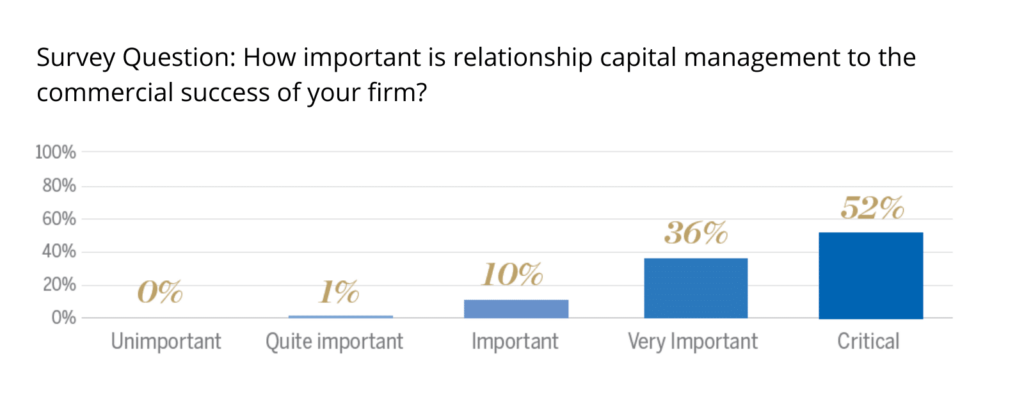One of the few things which will unite professional services firms across the industry is that they operate as a “people-driven business,” one where close knit relationships and personal contact make a key difference. The vast majority of professional services firms understand the value of relationships to this end, as shown by a new study by BoardEx, which confirms that building strong personal connections gives firms a competitive edge.

In BoardEx’s survey, an aggregate 88% of professional services respondents said relationship capital management was a very important or critical – while only 10% rate it as merely important. In contrast, no respondents at all were willing to rate it as unimportant.Since relationship capital management plays such a vital role in commercial success, it follows that those who do it well and maximize the business value of their relationship assets will have an edge over the competition. This is again borne out by the research. Some 85% of professional services respondents said their relationship capital had been a source of competitive advantage – against just 7% who believed it had not.
Following this, more than half of respondents ranked relationship capital among their organisation’s top three most valuable assets, and one in seven said it was their firm’s single most valuable asset, bar none.
So how do relationships matter?
In terms of just how relationships work to boost a firm’s performance, 25% of business executives said they only work with external advisors they consider to be inside their network. Beyond this meanwhile, 71% work equally with advisors inside and outside their professional relationship network, meaning that strong relationships at least gets firms onto a shortlist.

“Having strong relationships across a firm’s area of expertise can therefore provide a direct sales opportunity firms might otherwise have missed,” said Cameron Ireland, Chief Executive Officer of BoardEx. At the same time, a strong network also leads to helpful recommendations. The ‘like economy’ of Facebook, or the review economy of Uber show how people that receive positive tips from a peer are more likely to spend money on a product – and consultants also benefit from this process.
When BoardEx asked corporate respondents what considerations mattered most when deciding whether to work with advisors with whom they had no previous connection, it was perhaps unsurprising that 94% said track record and expertise in the specific area were very important or critical.
More interestingly, though, 74% attributed the same weight to a recommendation from someone inside their personal network. When a corporate assesses an advisor they don’t know, a positive reference from someone they already know and trust is almost as influential as the advisor’s prior experience and delivery on similar projects – something which in recent years has helped to propel a number of challenger consultancies to success, in spite of having no history to rely on.
“From the key findings, it’s clear that treating relationships as assets, and reaching out to gain and build new ones, is essential for professional services firms wanting to capture new business with corporates,” said Ireland.
Maintaining relationships
BoardEx is a company that specialises in helping professional services firms identify, build and nurture their relationship capital. Based on their years of experience in this area, the researchers warn that maximising the business value of relationship capital is easier said than done, because in practice there are several challenges.

First of all, it are often partners and seniors that build and nurture relationships, and its based on a personal connection. By taking a siloed approach like this, it can be hard to consolidate all that information into a single view, which then can ensure a streamlined process for sales/business development. Second, the most effective relationship management requires some kind of ownership and governance, and typically, this does not exist. Companies rarely make one person accountable for relationship building or strengthening, while leaving it as a side job of partners who are already snowed under with work.As with many challenges nowadays, technology can hold the key. BoardEx says that just like companies using customer relationship management (CRM) platforms for their sales, professional services firms should use client relationship capital management platforms for business and strategic relationship growth and development.
At present, only 57% of firms in the industry use a relationship management platform for business and strategic relationship growth, while 39% don’t use such a system and 4% don’t even know if they have one – meaning there is a huge opportunity for firms to get ahead of their rivals on the matter.
Ireland: “Maximising the business value of relationship capital requires a modern and sophisticated management system capable of taking advantage of the whole asset structure of relationships.”
Even if they have such a system, however, firms don’t always know how to use it. Zeroing in on those professional services respondents who do utilise a relationship platform, the researchers found that only 11% of such firms “almost always” used it to identify new contacts and growth opportunities. Almost half meanwhile deployed it only some of the time, and 3% said despite paying for it, they had never used it. Resourcing restraints are the primary reason companies give for not using one.


As a result, around 40% of the leaders surveyed suggested they think the returns of such relationship capital systems would be insufficient to justify the costs.Meanwhile, those professional services firms that do use such a customer relationship management are using their systems at a fairly basic level, with CRMs showing who contacts are, but not mapping relationship paths or networks to people those contacts know. This means a CRM system cannot unlock hidden connections to facilitate warm introductions. In order to improve on current relationship management efforts, the authors advise firms to layer on a relationship capital management system such as BoardEx to their CRM backbone, which enriches results.
Ireland stated, “The implication is that many professional services firms with platforms, and all of those without one, are missing out on major opportunities for business development and growth. This is because they’re ignoring the potential not just of foundational relationship capital management but also of powerful incremental innovations, such as automated updates and proactive relationship mapping.”
Covid-19 proof
The importance of digitising relationship capital has also taken on another dimension in 2020. Professional services workers are well known for their huge travel commitments, in which they adopt a jet-set lifestyle to support clients in person in every corner of the Earth, or to build new relationships with firms beyond their domestic borders. With the advent of Covid-19, this has ceased to be sustainable, as the world has suspended travel to curb the spread of the virus.
With the option of face-to-face meetings and events effectively removed for some time to come, relationship networks are likely to play an even bigger role in the coming year at least. Amid a recession in which many businesses will be desperate for support, it will be vital to be able to reach into those networks in a way that does not require physical contact; something which today’s leading relationship capital management platforms enable.
In the unfolding crisis, the readiness and ability to use them effectively may be the crucial differentiator between the winners in any marketplace.
For more information, download BoardEx’s ‘Managing Relationship Capital as an Asset’ report.
Consultancy.org is an online platform for the global advisory and consulting industry. The website presents the latest news and trends in the sector.
